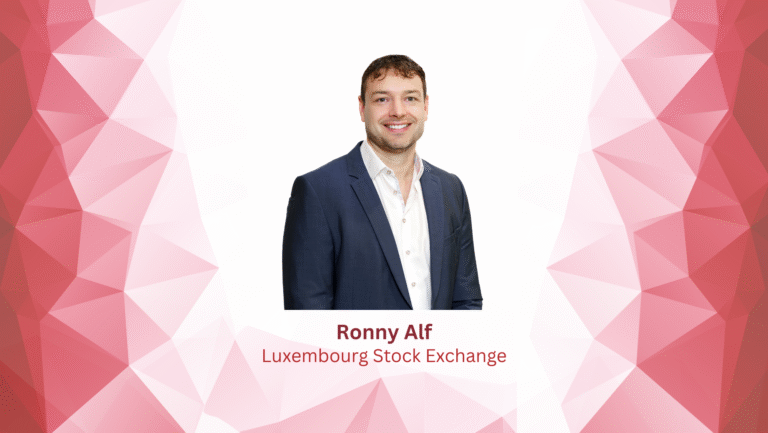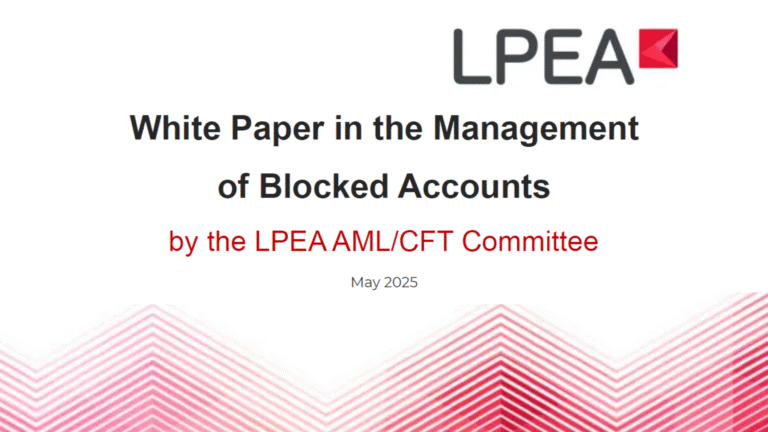Michael Jackson (Mangrove) on the future of fundraising, tokenisation and the rise of new asset classes
in Private Equity Insight/Out #1 | The Mighty Crypto
Interview by Natacha Oskian, Co-head of the FinTech team of Allen & Overy.
Michael Jackson is a partner at Mangrove Capital Partners and was previously COO at Skype, where he was responsible for rapidly growing an idea into a well-managed, high margin, multi-million dollar business. Before joining Skype, Michael launched nine mobile operations and two ISPs across Europe with Tele2. Michael is also on the board of Blockchain and is a contributor to the Blockchain Policy Initiative. He graduated with honours from University College London with a degree in Communications Engineering and is a guest lecturer in their MBA programme: The Business of Telecoms.
Some people say that cryptocurrencies and Initial Coin Offerings (ICOs) have formed a bubble which is about to burst. What can we expect in 2018?
Regarding cryptocurrency, the market has been driven heavily by expectation and desire. It’s an irrational market just now, but does that mean it’s going to burst? I don’t know. Cryptocurrency as such won’t stop. The question is whether the price of some of the currencies is irrational, and it certainly is. I think we’ll see some corrections in the market but, because it’s irrational and driven by sentiment, it’s very difficult to give any real prediction.
Next up are ICOs. Will we see many of these? Yes we will, and we’ll see a significant number because it represents a very efficient way for businesses to collect funds – it’s more time efficient than using venture capital if you have the right projects with the right people.
Crowdsourcing and ICOs emerged as alternative ways to raise money. How will these new forms of fundraising impact the Venture Capital (VC) industry?
I think it will impact the industry a lot. Indeed, it’s already impacting it. ICOs give people a much more open market; they’re able to reach a wider range of people, address their products more openly and solicit funding. At the moment the VC world is very opaque. In reality, there are very few venture capital funds, and finding them and getting a deal through with them is not straightforward. This is often a four-to-six month process involving many investment rounds, even in the early stages. In the ICO world however this can happen much more quickly and founders have more control. At the same time, ICOs attract investors that are somewhat immature when it comes to understanding the terms for investment and this is why we are going to see so many scams.
Do you think that ICOs are about to replace equity crowdfunding?
No, I think there is a big future for crowdfunding platforms and I think we have an antiquated fundraising world today where only one per cent of rich people can invest in growth projects and put their money into projects they love. And I look upon it in a broader context: some people say that the VC industry is being disrupted but VC constitutes a very small part of the fundraising environment for small businesses. The banking environment is much larger and of course, a lot of businesses get their funding through an overdraft facility. To be honest, I think the banks are going to be much more side-lined by crowdfunding and ICOs than VC.
An effective crowdfunding environment allows a company to raise money from customers, employees, supporters, family, etc. Today it is very difficult for a company to fundraise, and I would like to see the European ecosystem developing and facilitating crowdfunding platforms like Kickstarter and Crowdcube to make sure small businesses can raise money in a much more diverse world.
An ICO is a very geeky thing to do just now and building a token-based company is also very complex. I get ICO requests all the time and one of the checks I always make is to ask: “Can you do this project without a token; what does the token give you? What does it give to your customers? Is it really necessary or are you just jumping on the bandwagon?” And in many cases you don’t need a token or blockchain. ICO costs are high and if you fail, it’s going to be really difficult to get VC fundraising at a later stage.
Do you see a way of regulating ICOs, particularly offers to retail investors, without lowering any of the existing investor protection standards?
In general, as you know, there’s a good framework around “high net worth” or “well informed” investors that already exists in AIFMD and MiFID. I can imagine that regulators may continue to apply these principles for ICOs. There will be, however, a huge number of operational difficulties in handling payments received from these ICOs in cryptocurrencies. It’s not like you can just call your bank and put the money in your account. It is impossible at the moment, but it will happen. Custodians for cryptocurrencies will naturally appear as a lot of people have cryptocurrency and they do not want to keep it under mattress.
Do you know of any custodian who is accepting cryptocurrencies in Luxembourg?
No, not yet. There should be one; there’s no reason why there shouldn’t be one. They will need a different concept for security on a multi-level. Something needs to happen around the regulatory framework.
The challenge is coming because most companies and ICOs are advertising on the Internet and Facebook, tapping into the retail world. But we know that selling financial products to retail investors is not allowed or at least it is very tightly regulated. I haven’t seen a need for new regulation to stop people doing bad things in ICOs as long as it can be stopped now under the existing laws. People ask me why this isn’t happening, why isn’t the SEC enforcing this? My view is quite simple: there’s no hurry for regulators. I think a lot of the early investors and entrepreneurs I meet look at securities law as they do the Highway Code; if the police don’t catch you speeding then you pretty much get away with it and don’t need to worry. But this isn’t the case with securities law and other regulations. I think the advantage we have in Europe is that the regulator can come up with circulars very quickly, which means that the schemes people are cooking up with Switzerland, Singapore, and the Cayman Islands can be stopped very quickly in Europe with a CSSF circular, for example.
There is another school of thought about regulators wanting to stop cryptocurrency because it may undermine the Euro. I think that’s complete nonsense. Regulators, at least in Europe, don’t exist to stop you doing things. They exist to protect investors, so they are not going to stop it, but what they will do is clamp down hard on retail.
What they need to do, in my opinion (and I think that this is something we can work on), is establish a retail investment framework that is acceptable for smaller issuances and doesn’t require a full MiFID implementation for an offering. When it comes to the prospectus directive, we need to be able to think about mini prospectuses for small cap offerings rather than maxi prospectuses. We need to think about what kind of organisations can make the issuances. The bottom line is that we don’t have a facility in Europe for smaller fundraisings, and yet we have tremendous amounts of money tied up in zero interest bank accounts from people who have a few thousand Euros and who like to invest some of it into the venture of someone they know and trust.
Another trend from the last ten years is the greater transparency of businesses. It used to be impossible to get an idea of how a business was doing. Now we can read about it on the internet, see it on their website, their forums, in their customers’ responses. We can also check their audited annual accounts in the Registre de Commerce of Luxembourg and in most of Europe.
I would like to reset our expectations in terms of regulation and see a new mini IPO environment emerging for ICO-like smaller listings, accessible for retail investors. I think we’ve maybe gone too far in terms of regulation and MiFID II is a good example of this. The goal of the European financial system should be to get more capital at work powering businesses and business growth in a responsible and protected manner. The law just needs to be adjusted to help promote growth in the European economy.
“ICOS GIVE PEOPLE A MUCH MORE OPEN MARKET; THEY’RE ABLE TO REACH A WIDER RANGE OF PEOPLE, ADDRESS THEIR PRODUCTS MORE OPENLY AND SOLICIT FUNDING.”
“I THINK WE HAVE A VC SYSTEM WHICH HAS NOT FUNDAMENTALLY CHANGED SINCE IT STARTED IN AMERICA IN THE EARLY 70S.”
“THE LAW JUST NEEDS TO BE ADJUSTED TO HELP PROMOTE GROWTH IN THE EUROPEAN ECONOMY.”
Mangrove Capital Partners’ team: Mark Tluszcz, Hans-Jürgen Schmitz, David Waroquier and Michael Jackson.
Your recent report “Tokenisation: implication for the venture capital industry” acts as something of a wake-up call to all VCs to take the competition seriously. Why did you choose to go down this route?
Because I’m annoyed about the process. I see the fundraising process as inefficient for VC companies and for the entrepreneur who has to spend a lot of time going through a somewhat random and unstructured process. In the end it depends a lot on whether an entrepreneur is reaching the right person at the right time and who is in the right mood to listen, and that doesn’t feel right to me.
I think we have a VC system which has not fundamentally changed since it started in America in the early 70s or just beforehand, and three decades later in Europe. I think it is the right way to look at it, and at Mangrove Capital Partners we are certainly not afraid to question our own existence. Indeed we ask our entrepreneurs to question their own existence, to be disruptive, to think, to move forward, and move with the times, and, of course, we can’t sit in our fancy offices in Luxembourg earning 2% management fee and 20% carry without continually demonstrating our value.
Do you consider tokens and cryptocurrencies as an asset class? What kind of triggers could make it available for a wider range of investors?
Yes, I think they are an asset class with proper characteristics, uncorrelated to other asset classes and to the Stock Exchange or the real world or anything at the moment. It’s rather sentiment-based.
In terms of a trigger, it needs to come through structured products and should be available through trading platforms like E-trade, where you can already buy Bitcoin, or through banks. In terms of the structured products, I could imagine funds-based products with baskets of cryptocurrencies and derivatives.
Do you see any interest among VC firms in the potential for using digital currencies and ICOs?
Yes. I was recently involved in an experiment with a Berlin-based company where equity was tokenised, so that one token was equal to one share. One of the aims of this was to manage the employee stock option plan, which is very complicated and involves managing, granting, vesting, cancelling and exercising of stock options for a large number of employees. And it’s a nightmare. To do this, we created a smart contract which is a self-executing contract, connected with the employee payroll database, so it could automatically manage the share structure or the share cap online.
Entrepreneurs and other players have been looking at tokenisation because it gives them access to the crypto world and I think there are going to be some crypto-funds in the future. We are looking at it at Mangrove as well, trying to find out when it would really make sense. Everybody says it’s going to give you liquidity in the fund because your shares or units are going to be tradable. But if you are going to have tradable units then you almost become a mutual fund, so what’s the point for VC firms?
Can you invest in a company today using ETH (Ethereum) instead of using Euros, for example?
There’s nothing that really stops us from doing that today. Our limited partnership (LP) agreement, however, stops us at the moment because we disclose the currencies we invest in, amongst other things. But if we said to our limited partners that we want to invest in a company with the underlying asset being an equity priced in Ethereum or other distributed ledger, that would be okay.
For the majority of the funds, our fund structures oblige us to invest in equity. To invest in tokens, a change to the LP agreement would be required, meaning that LPs would need to be comfortable with that. And that’s a stretch when it comes to the institutional world, typically represented by large insurance companies or pension funds, for example. When they talk about alternative assets or alternative lending they are talking about household mortgages as alternative lending or securitised assets. It’s going to be a long, long way to cryptoassets.
As a VC have you considered using an ICO as an exit strategy for your portfolio companies?
Yes, absolutely.
In which type of companies would you use it? Only in tech companies?
Like IPO, it would be the kind of company that can do a successful ICO and engage with a lot of customers. It’s a good exit strategy. We haven’t done it yet but it could happen.
Is it in the pipeline, maybe?
No, not really, but only because we don’t have an obvious target in our portfolio.
Should Luxembourg aim to become the global financial centre for cryptocurrency funds (as it did for mutual and alternative funds), and if so, what steps need to be undertaken to achieve this?
The answer is a resounding yes. First of all, why would we not do that? We have a good fund environment. We obviously need people who are willing to set up the infrastructure around that, as we said, the custodian, the accounting, all of this needs to be there. I think the risk management framework is fine. We have tier-one data centres and good ideas.
Secondly, I believe we can establish a mini-listing concept as we have a fairly well-functioning stock exchange. And we are nimble enough to do it, as we have a good regulator and the Luxembourg economy is pretty strong. We just need to come up with the right framework.
As we come to the last question… have you invested your own funds in virtual currencies or tokens?
Yes, I have.








